Do you think that putting food waste (fruit peels, vegetable leaves, leftovers) into a compostable garbage bag with green leaves printed on it, which looks very "environmentally friendly", and then throwing it into the community's food waste bin (wet garbage bin), is environmentally friendly?
Many customers who purchase our compostable bags in large quantities are curious, can I use compostable bags to deal with food waste? The answer is yes, but it depends on how and where you compost.
In this article, I will share all the information I found about compostable food waste bags and how to use them correctly to deal with food waste.
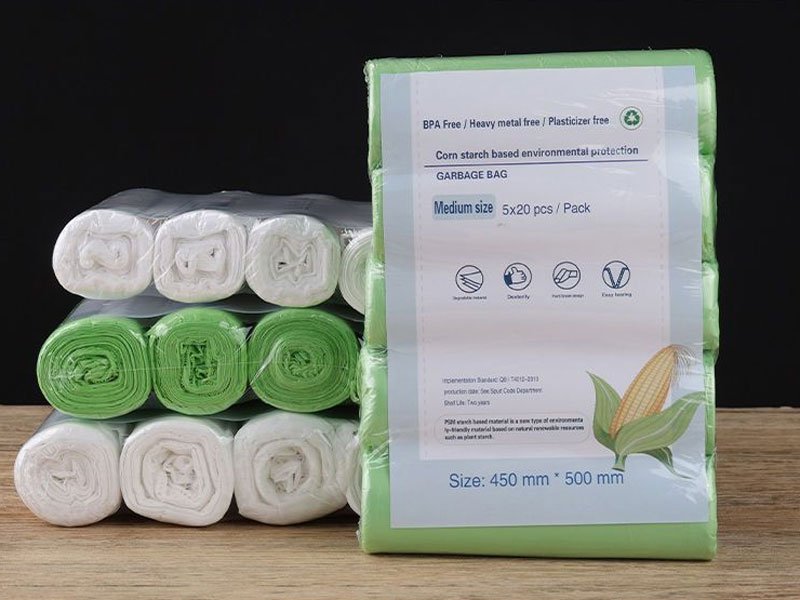
Why Use Compostable Bags for Food Waste?
Using compostable bags to dispose of food waste is a cleaner, more environmentally friendly option.
Clean Bins: Helps keep your food bins clean and prevents unpleasant odors.
Easy to Carry: Tie up the full bag and easily take it to your compost bin or green waste bin.
Better for the Planet: Compostable bags don't leave behind microplastics like traditional plastic or "biodegradable" bags do.
What Food Is Compostable
| Category | Compostable Items |
|---|---|
| Fruits & Vegetables | Peels, skins, cores, stems, spoiled produce |
| Grains & Breads | Plain pasta, rice, bread, oats (no oils or sauces) |
| Coffee & Tea | Coffee grounds, paper filters, tea leaves, plastic-free tea bags |
| Egg & Nuts | Eggshells, peanut shells, pistachio shells (no walnut shells) |
| Dry Foods | Old flour, stale cereal, expired grains |
| Corn & Plants | Corn husks, corn cobs, leafy greens, seaweed, kelp |
| Paper Products | Paper napkins, unbleached paper towels (if not greasy or chemical-coated) |
Compostable vs. Biodegradable
On supermarket shelves or e-commerce platforms, we often see the words "compostable" and "biodegradable". They are often used interchangeably, but the meanings behind them are very different. Understanding this is the first step to properly dispose of garbage.
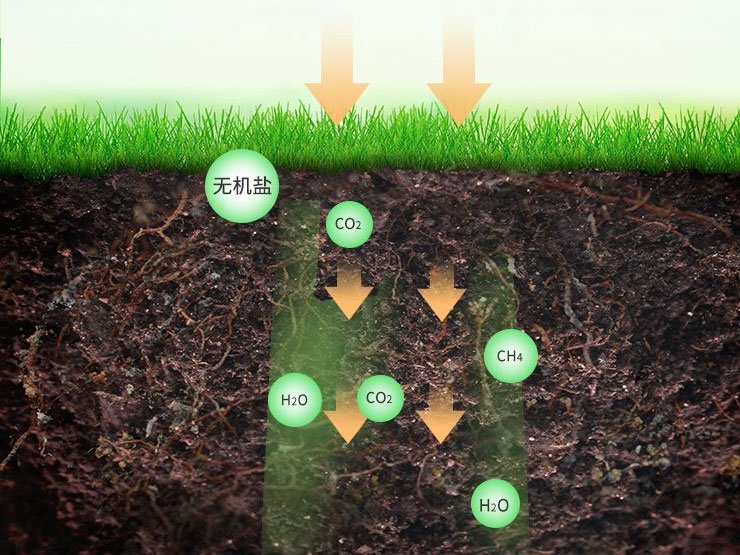
Biodegradable Bag
A very broad and often abused term. It simply means that the product can be decomposed by microorganisms (such as bacteria and fungi) in nature.
It does not define the time, conditions and final products of decomposition. A "biodegradable" plastic bag may take decades or even hundreds of years to decompose, and in the process it may break into countless microplastic particles, causing lasting pollution to soil and water sources. In essence, almost everything (including traditional plastics) will eventually biodegrade, but this does not make it environmentally friendly.
Compostable Bag
A term with strict scientific standards and legal definitions. It means that the product must be completely decomposed into carbon dioxide, water and organic-rich compost within a specified time (e.g. 90-180 days) under specific industrial composting conditions (usually 55-70°C high temperature, high humidity, oxygen-rich and specific microbial environment), and no visible, toxic residues can be left.
The decomposition of compostable bags is conditional and time-limited, and the final product is beneficial to the soil. Think of it as a student who has passed a rigorous exam, while "biodegradable" is like a student who claims to "love to study". The former has a certificate, while the latter only has a slogan.
In the garbage sorting system, the only thing we need to pay attention to is certified compostable bags. Any bag that is only marked "biodegradable", "environmentally friendly" or "green" but has no authoritative certification should be regarded as ordinary plastic and cannot be thrown into the kitchen waste bin.
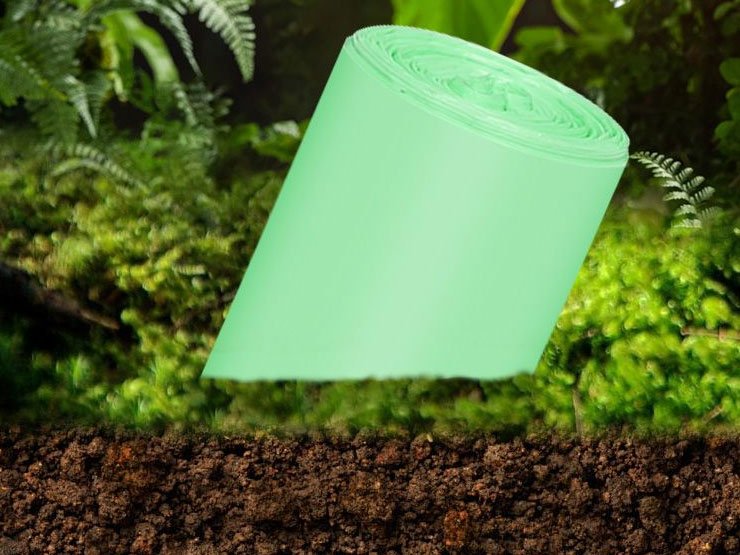
Can You Put Compostable Bags in Your Green Bin?
It depends on the policy of each local government, some accept certified compostable bags in green waste bins. But not everywhere. Some compost centers only accept food waste without any bags. Some only accept certain brands or types of compostable bags.
To be safe, I recommend:
Check your local waste disposal or municipal website.
Look for bags with BPI certification or EN13432 logo.
Avoid bags that are only labeled "biodegradable". These bags are usually not accepted.
If the bag is not certified, it may not be able to fully decompose in industrial composting facilities.
Are All Compostable Bags Safe for Food Waste?
Not all compostable bags are created equal. Some are designed for home composting, while others are for industrial composting. Home compostable bags break down at lower temperatures and don’t require special equipment. Industrial compostable bags, however, require higher temperatures and special conditions.
Always check the label before buying:
If the label says “OK Compost HOME,” it’s safe for backyard compost bins.
If the label says “OK Compost INDUSTRIAL” or “BPI Certified,” it’s safe for composting facilities.
Also, be wary of “greenwashing.” Some products claim to be “eco-friendly” or “green,” but aren’t truly compostable. Always check for true certifications.
How to identify a "real" compostable bag?
BPI Certification (Biodegradable Products Institute)
Region: Mainly used in North America (USA, Canada).
Logo: Usually a green leaf shape with the words "COMPOSTABLE" and "BPI" printed on it. This logo means that the product meets the ASTM D6400 standard and can be safely decomposed in commercial composting facilities.
TÜV AUSTRIA Certification (OK compost)
Region: European standard, but widely recognized worldwide.
Logo: It has two common levels:
OK compost INDUSTRIAL: Indicates that the product meets the EN 13432 standard and is suitable for industrial composting facilities.
OK compost HOME: Indicates that the product can be decomposed in a home composting environment at a lower temperature and slower speed. This is a more stringent certification.
AS 4736 Certification
Region: Australian standard, suitable for commercial composting systems.
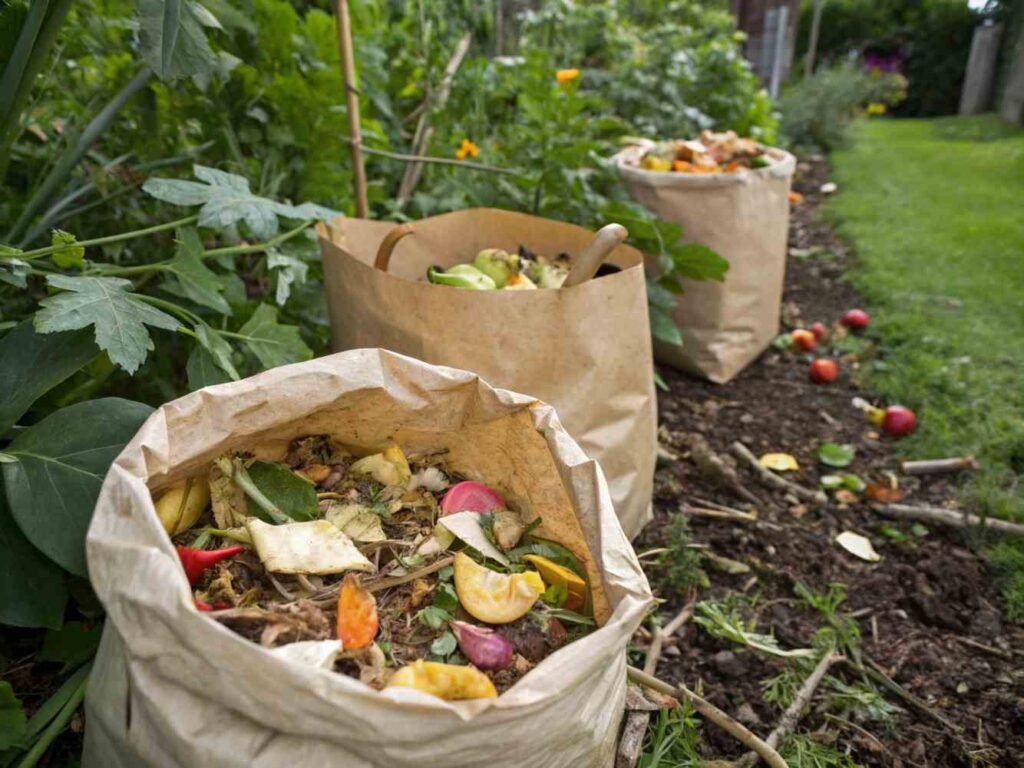
Why Don't Some Cities Accept Compostable Bags?
The Speed Mismatch
Modern industrial composting facilities are like efficient "cooking" factories, with strict processes and schedules. A typical processing cycle may only be 60 to 90 days. Although many certified compostable bags can theoretically decompose within 180 days, they may only be half decomposed or still retain the shape of bags at the end of the processing cycle.
Contamination Risk
When the composting process ends, if these bags are not completely decomposed, they will be mixed in the final organic fertilizer like ordinary plastic bag fragments. This will seriously reduce the quality of the compost, turning these fertilizers that should nourish the soil into "plastic waste" that cannot be sold or used in agriculture and gardening, causing huge economic losses and waste of resources.
Sorting Difficulty and Confusion
In large-scale waste treatment plants, workers and machines need to sort out contaminants in a very short time. From the appearance, there is almost no difference between a green compostable bag and a green ordinary plastic bag. To prevent an entire batch of food waste (which could weigh several tons) from being contaminated by a single ordinary plastic bag, the safest and most cost-effective approach is to eliminate everything that looks like a plastic bag as a contaminant.

How to properly dispose of kitchen waste
Step 1: Check local regulations!
Search online: Type "[your city name] + food waste disposal" or "[your city name] + wet waste regulations" into the search engine.
Visit official websites: Find the municipal website, the website of the Urban Management Bureau, or the official website of the company responsible for waste management in your city.
Check promotional materials:Pay attention to the classification guides posted next to the community trash cans or the promotional brochures distributed by the community.
Step 2: Take action according to the regulations
1.: If your area clearly states that "certified compostable bags are accepted"
Congratulations! You can continue to use them.
The right way: When purchasing, be sure to check the certification marks such as BPI or TÜV AUSTRIA mentioned above. When using, do not overfill the bag and make sure the bag mouth can be tied tightly to prevent food waste from scattering.
2.: If your area says "Do not use any plastic bags" or "No bags"
This is a common practice in many large cities at present. Please strictly follow it and do not use any bags.
The first choice: No bags (Go Bag-Free). This is the most recommended, environmentally friendly and foolproof way.
Prepare a small bucket with a lid (about 5-10 liters) in the kitchen to collect the kitchen waste generated that day.
Every day or every two days, pour the kitchen waste in the bucket directly into the large kitchen waste bucket (green bucket/wet garbage bin) downstairs or outdoors.
Take the empty bucket home and simply rinse it with clean water.
Tips to keep the kitchen bucket clean:
Paper towel/newspaper pad: Place one or two used kitchen towels, old newspapers or ink-free cardboard (such as the oil-free part of egg boxes and pizza boxes) at the bottom of a clean bucket. They can effectively absorb excess water and oil, making dumping and cleaning easier.
Deodorizing with baking soda: After each cleaning, you can sprinkle a thin layer of baking soda on the bottom of the bucket, which can effectively absorb odors.
Freezing method: For kitchen waste that easily produces odor (such as fish bones and shrimp shells), you can first put them in a small bag and place them in the freezer of the refrigerator. When you want to throw away the garbage, take them out together and pour them into a large bucket.
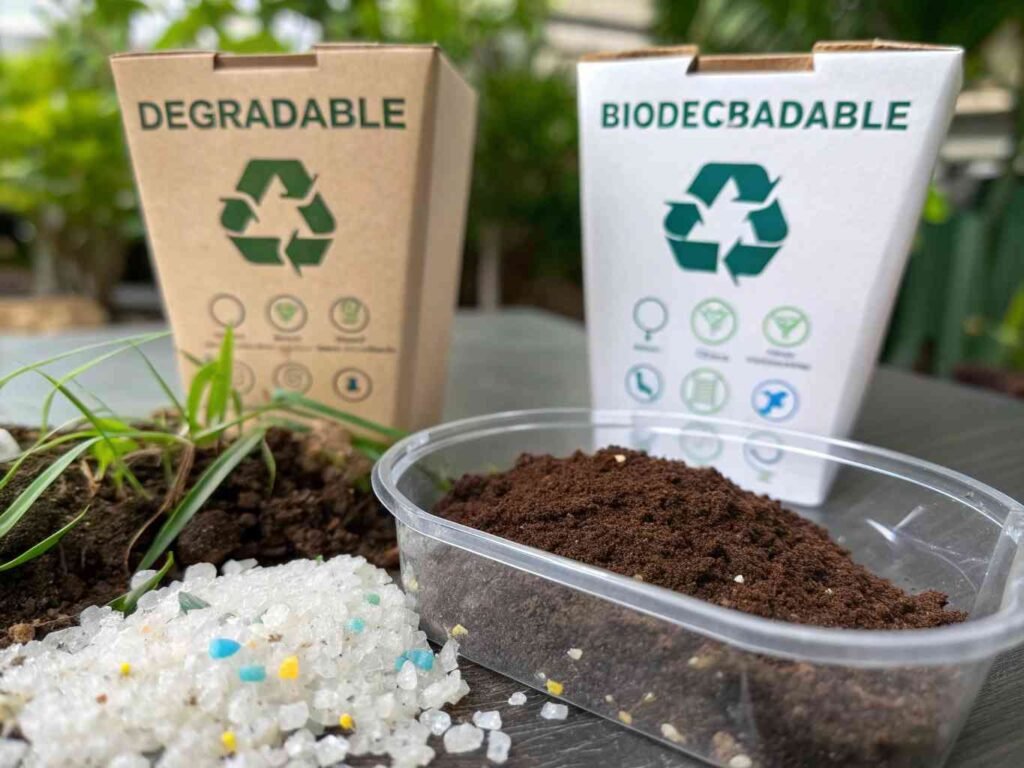
What products can replace compostable bags?
Paper Bags
Many areas accept ordinary kraft paper bags or special kitchen waste paper bags because paper itself is an organic matter that can be composted with kitchen waste. It is an environmentally friendly compostable product, and you can reuse the paper bags you get when shopping. But it also has a disadvantage that it is easily soaked and broken by wet kitchen waste.
Old newspapers
This is the most economical, retro and environmentally friendly choice. Most modern newspapers use soy ink, which is harmless to compost. You can learn to easily fold a few newspapers into a simple garbage container to hold kitchen waste with little moisture, and throw it into the kitchen waste bin together with the newspaper after use.
Reusable Container
This is the core of the "naked throw" method. A plastic or stainless steel container with a lid is your best friend in the kitchen. It is easy to clean and can be reused an unlimited number of times, eliminating the need for any disposable bags from the root.

Where to Buy Certified Compostable Bags for Food Waste
BioBag – widely trusted and BPI certified.
If You Care – great for small home compost bins.
GreenPolly – made from recycled and compostable materials.
When buying, I always check:
Certification labels: BPI, OK Compost, EN13432.
Thickness: Thicker bags (like 20 microns) hold up better for wet waste.
Size: Choose the right size for your kitchen bin.
If you compost a lot, buying in bulk saves money and reduces packaging waste.
FAQ
Can I compost these bags at home?
Yes, if the bag is marked “home compostable.” Otherwise, it may not break down in backyard systems.
How long do compostable bags take to break down?
In industrial composting, it takes about 90 days. At home, it may take longer, depending on temperature and moisture.
Are they safe for freezing food waste?
Some are, but not all. Freezing may make the bags brittle. Look for freezer-safe labels if needed.
Can I use compostable bags in a worm bin?
Yes, if they’re thin and home compostable. Worms can eat through them over time.
Conclusion
Can you use compostable bags to handle food waste? Yes, but you need to choose the right way and use them correctly. Look for certified bags, check your local composting rules, and don't confuse biodegradable and compostable.





